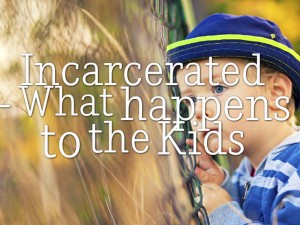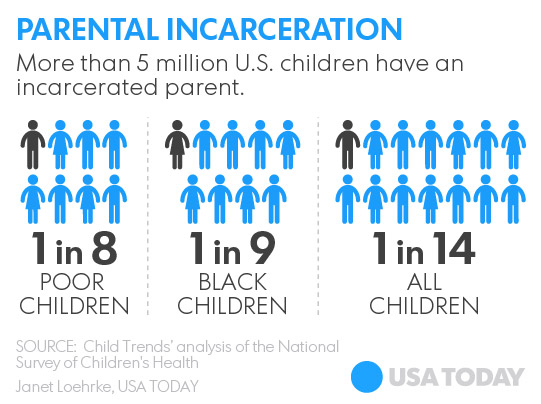The question that was burning in my wife’s mind as I faced an uncertain future – one that included the possibility of prison – was what would happen to our children? We both were concerned as the future that we faced as a family was destined to be fraught  with judgment that could undermine all that we wanted for our two sons.
with judgment that could undermine all that we wanted for our two sons.
Today one in 14 children have at least one parent behind bars as the United States has the highest incarceration rate of any developed country. Incarcerating people – while perhaps well intended to curb crime – has consequences that radiate far out from the person being punished. The people most vulnerable to negative consequences are the children.
In a recent article in USA Today the following is stated:
Child Trends, an organization based in Bethesda, Md., is releasing its report Parents Behind Bars: What Happens to Their Children? on Tuesday. The group hopes the findings will prod prisons, schools and lawmakers to make changes that will help young people who have incarcerated parents.
“The issue of what some people have termed mass incarceration in the United States has really attracted a lot of attention so we were interested in looking at this issue,” David Murphey, report co-author and senior research scientist at Child Trends, said in a telephone interview with USA TODAY. “We feel it’s important to put this on the radar screen” and help people “realize there’s more to it than the adults themselves,” Murphey said.
The 20-page report indicates that when it comes to black children, the number who have had an incarcerated parent rises to one in nine, and poor children are three times more likely to have had an incarcerated parent than children from higher income households. Rural children are more likely than urban children to have had an incarcerated parent, the report says. In the 6-to-11 age group, children who have had parents behind bars have problems in school, and the likelihood of such problems increases among older children, according to the report.
“Most research finds negative outcomes for these children, such as childhood health and behavioral problems and grade retention,” Murphey said. “Children who grow up with a parent in prison are more likely to suffer from poor mental and physical health in adulthood.”
What did happen…
While the report referenced above would indicate that stigma and shame will negatively impact children of incarcerated parents, we (my ex-wife) and I found that – that didn’t have to be the truth of the outcome.
The USA Today article states:
Child Trends recommends reducing the stigma tied to having a parent who is incarcerated, improving communications between children and incarcerated parents, and making prison visits less stressful for children by creating child-friendly visiting areas and relaxing security procedures for children.
For my wife and myself, we elected to be transparent with our children sharing openly about what (in my case) daddy did, what was wrong with it, what dad should have done and that every choice we make has a consequence. If a child does something wrong, we explained, they get punished. Well, dad did something wrong and he’s getting punished.
The explanation was simple, clear and connected the dots between choices we make and behavior that follows.
The other major choice we made was to keep the lines of communication open even while I was incarcerated. My wife was extremely angry with me and the choices I made, but she had the sense to recognize that her anger could either be used to negatively impact our two sons or be contained (directed at me as it should be) without bleeding over into our relationship and parenting with our children.
Lastly, what might have given us both a head up in the child rearing world was education. We, both reasonably well educated, knew that making education a priority for our children was critical. At no time was anything less than a great education an option. My wife was concerned about what our children might experience from other kids, but soon we realized that was not an issue. In fact, other kids didn’t raise the issue cause they knew that our son’s dad had been in prison and there was a healthy fear of being a bit too bold to make fun.
In the end, my time in prison was 20 years ago and both my sons are grown men. They may not be happy with my earlier choices, but they both know full well that every choice has a consequence. I am proud of my sons and thankful for their mother who, despite all the obstacles I placed before her with my stupid actions, reared our sons well.
The right formula: two parents loving their sons – encouraging them to know that choices have consequences – helping them see the value of education – seems to be a winning formula. Not every one has to be a statistic. After all, through your choices you can become a victim or victor – you choose!
YOUR COMMENTS ARE WELCOME!



Thank you for sharing this, Chuck. Any thoughts on weaving this into your keynote at the conference next year? This is a good message that MANY parents need to hear.
Absolutely!